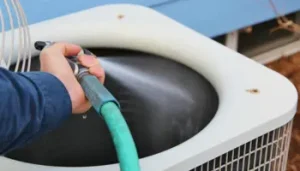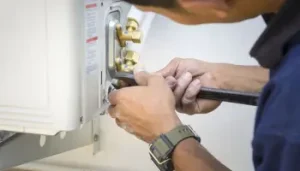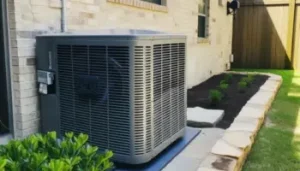In today’s digital age, smart home technology has revolutionized our lives, offering convenience, efficiency, and enhanced control over various aspects of our homes. Smart home integration opens up heating, ventilation, and air conditioning (HVAC) systems possibilities. This blog post will explore integrating smart home technology with HVAC systems. We will discuss the advantages of smart thermostats, remote monitoring, and energy management systems. By leveraging these technologies, homeowners can enjoy increased comfort, convenience, and significant energy savings while optimizing their HVAC systems’ performance.
Smart Thermostats: Precise Control and Energy Savings:
A key component of smart home integration with HVAC systems is the installation of smart thermostats. These advanced devices offer precise control over temperature settings and allow homeowners to customize and automate their heating and cooling schedules.
One significant advantage of smart thermostats is their ability to learn and adapt to homeowners’ preferences. Smart thermostats can create personalized temperature schedules that align with homeowners’ routines by analyzing occupancy patterns and user inputs. This feature eliminates manual adjustments and ensures optimal comfort while minimizing energy waste.
Additionally, smart thermostats can be controlled remotely through smartphone apps or voice assistants. This functionality allows homeowners to adjust temperature settings even when away from home, ensuring a comfortable environment upon their return. The ability to remotely control the HVAC system also facilitates energy savings by allowing users to adjust settings based on weather conditions or unexpected schedule changes.
Furthermore, many smart thermostats offer energy usage reports and insights. Homeowners can monitor their HVAC system’s energy consumption in real time and receive recommendations on optimizing energy usage. Homeowners can significantly reduce their energy bills by making informed decisions about temperature settings and identifying energy-saving opportunities.
Remote Monitoring: Enhanced System Performance and Maintenance
Another valuable aspect of smart home integration with HVAC systems is remote monitoring capabilities. Connected HVAC systems can have sensors and monitoring devices that provide real-time data on system performance, air quality, and equipment status.
Remote monitoring allows homeowners to monitor their HVAC systems closely and promptly identify any issues or inefficiencies. For example, if a sudden temperature fluctuation occurs or a component malfunctions, the system can send alerts to the homeowner’s smartphone. This early detection enables timely action to address the problem, preventing potential system failures and costly repairs.
In addition, remote monitoring facilitates proactive maintenance. HVAC service providers, such as Diamond Heating & Cooling Services, can remotely access system data and identify maintenance needs or potential issues. Technicians can schedule service appointments based on accurate information, reducing downtime and ensuring optimal system performance.
Energy Management Systems: Optimized Efficiency and Cost Savings
Energy management systems further enhance the integration of smart home technology with HVAC systems. These systems provide centralized control and automation of various energy-consuming devices, including HVAC systems, lighting, and appliances.
Homeowners can maximize energy efficiency and cost savings by integrating the HVAC system into an energy management system. For example, the system can coordinate the operation of the HVAC system with other devices, ensuring that energy consumption is minimized during peak electricity rate periods.
Energy management systems can also leverage weather forecasts and occupancy sensors to optimize HVAC operation. By analyzing weather data and occupancy patterns, the system can adjust temperature settings and HVAC operation accordingly, reducing energy waste and optimizing comfort.
Additionally, energy management systems often provide detailed energy usage reports, allowing homeowners to track their energy consumption and identify areas for improvement. This information empowers homeowners to make informed decisions about energy usage and implement energy-saving strategies.
Conclusion:
Smart home integration with HVAC systems offers homeowners numerous benefits, including increased comfort, convenience, and significant energy savings. Smart thermostats provide precise control and automation, optimizing temperature settings and reducing energy waste. Remote monitoring capabilities enable homeowners to monitor system performance, detect issues, and schedule proactive maintenance. Energy management systems facilitate centralized control and automation, maximizing energy efficiency and cost savings. By integrating smart home technology with their HVAC systems, homeowners can enjoy enhanced comfort, improved convenience, and reduced energy bills. Contact Diamond Heating & Cooling Services today to explore the possibilities of smart home integration for your HVAC system.



